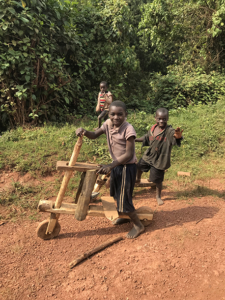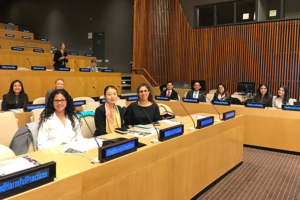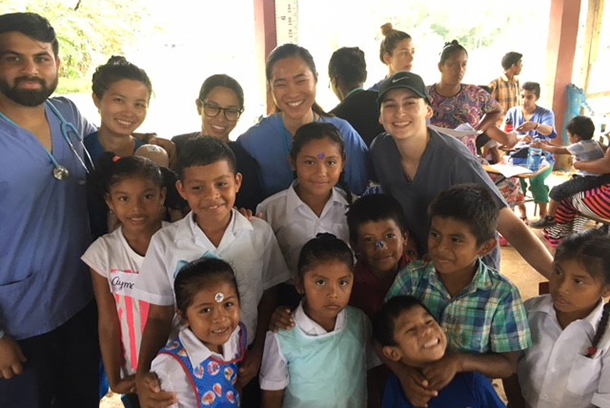“Always have respect for the professionals in the country you are working in and always be humble. They always have more to teach you than you are teaching them.”
Lessons in humility and respectfulness were central elements of the keynote speech delivered by Alexander Van Speybroeck, MD, MPH, clinical associate professor of pediatrics (clinician educator) at the Keck School of Medicine of USC, at the Spring 2018 Global Citizenship Roundtable held April 13 in Aresty Auditorium.
Organized and sponsored by the Master of Science in Global Medicine program, the daylong symposium highlighted the international learning and research experiences of students in the global medicine program, inspiring many in the audience to think more carefully about the health care access they may take for granted in the United States, as well as to act more thoughtfully when addressing health challenges in communities around the world.

Children in Kabale, Uganda taking a ride on their traditional wooden bicycle. (Photo/Courtesy Raquel Ribeiro)
The day opened with Global Medicine (GM) students who traveled to Panama, Uganda, and UNICEF Headquarters in New York City sharing stories to educate those assembled about the projects they had undertaken around the world. From working toward better futures for child refugee migrants, to educating communities about methods to avoid parasitic disease, to investigating how to improve continuity of care for patients in rural locations, GM students were enthusiastic and engaged. The impact of students’ time spent beyond USC classrooms was evident not only in their project descriptions, but in their dedication to continuing their work to help understand and respond to health challenges far beyond the scope of their current studies.
One example of those who found opportunities to continue their work in a community outside the U.S. came from the Dhablania and Kim Family Global Medicine Fellows who traveled to Bocas del Toro, Panama, to assess factors contributing to rates of anemia and diabetes in this isolated population. Supported by the Dhablania and Kim family, the trip was held in conjunction with the ongoing work of Benjamin LaBrot, MD, clinical assistant professor of medical education at the Keck School, and his not-for-profit organization, Floating Doctors. The DK Fellows traveled to a community where women are disproportionately affected by these diseases to work to understand why, with the aim of eventually improving health outcomes in the region.
After hearing students share their experiences with such excitement, Van Speybroeck, the keynote speaker, emphasized that global health work takes good ideas and hard work, not just advanced degrees. He commented, “Students and trainees can do a lot. Find what you are interested in. Find what you are passionate about, and do it.”
Van Speybroeck discussed his work as the co-director of the Children’s Hospital Los Angeles Residency Program Global Health IMPACT Track and reminded students that his own residents in the program were focused on issues that could be addressed with health education and health promoting behaviors all over the world, like hand-washing and breastfeeding, not just those requiring complicated surgical and technical skills. While he guides the work of residents in the Philippines, Malawi and Uganda, among other locations, Van Speybroeck also personally volunteers with medical missions for pediatric patients with spina bifida, muscular dystrophy and cerebral palsy. Sharing stories from his work in low-resource settings in Asia, Central America, and Mexico, Van Speybroeck repeated the importance of understanding the needs of the people, communities and families being served. He emphasized that, even with years of training and medical experience, he was always learning more.

MS in Global Medicine students sat in at the General Assembly Hall at UN headquarters in New York City. (Photo/Jennifer Kim)
The day continued with student presentations from those who had worked on health care management and administration improvements in Panama and Brazil. These student presenters reminded the audience that making health care systems work more efficiently so that more patients can be seen and more care can be given that will improve, if not transform lives, also was critically important to the global health care landscape.
After a day of dialogue, Program Director Elahe Nezami, PhD, associate professor of clinical preventive medicine and medical education, and associate dean for undergraduate, masters and professional programs at the Keck School, ended the day with thanks to those who were gathered to listen and learn.
“The Global Citizenship Roundtable never fails to remind me of how important it is to share what we know with each other,” she said. “The work of our students, DK fellows, and faculty inspires us toward more learning and more action in communities near and far, reminding us that there are many ways to make a difference. This is always a day of stories that need to be told and need to be heard and I am always honored to hear them from our Global Medicine family.”
The next Global Citizenship Roundtable will take place in August.
— Ginny DeFrank


